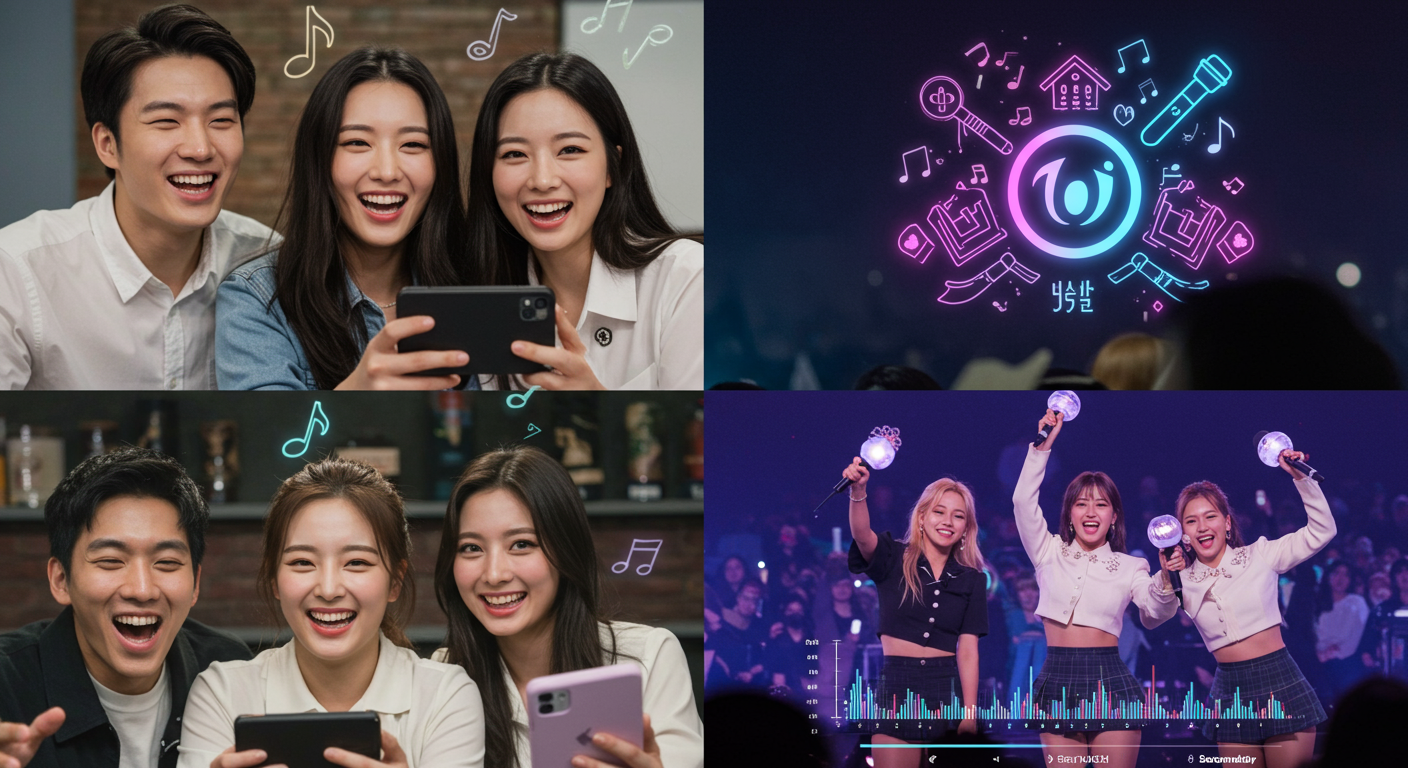K-Pop's Global Ascent: How Netflix & Chart Success Are Reshaping the Music World
K-Pop's Global Ascent: How Netflix & Chart Success Are Reshaping the Music World
Ever wondered how K-Pop went from a niche genre to a global phenomenon, captivating millions and dominating charts worldwide?
I remember a time when K-Pop was something only a handful of us knew about, tucked away in obscure online forums. It felt like our little secret, you know? But then, something shifted. Suddenly, you couldn't scroll through social media or turn on the TV without seeing a new K-Pop sensation. It’s been incredible to watch. And lately, with Netflix throwing its weight behind projects like "KPop Demon Hunters" and groups like TWICE and ATEEZ smashing global album charts, it feels like we're witnessing a whole new era. This isn't just music anymore; it's a global cultural movement, powered by strategic collaborations and incredibly passionate fans.
 Description : "A vibrant, energetic illustration of diverse young adults from various backgrounds excitedly watching K-Pop performances on their devices, with subtle glowing musical notes floating around them, in a futuristic and lively setting."
Description : "A vibrant, energetic illustration of diverse young adults from various backgrounds excitedly watching K-Pop performances on their devices, with subtle glowing musical notes floating around them, in a futuristic and lively setting."
Table of Contents
The Unstoppable Rise of K-Pop: A Personal Perspective
Honestly, seeing K-Pop go from something you had to dig for on obscure forums to a genre dominating global airwaves has been nothing short of surreal. I remember countless late nights, armed with shoddy internet, trying to find grainy fan cams or translated lyrics. It felt like we were part of a secret club, a small but dedicated community appreciating this incredible music. Fast forward to today, and my teenage self would simply faint. K-Pop isn't just a genre anymore; it's a cultural phenomenon. It has carved out its own space in the global music industry, proving that language barriers are pretty much meaningless when the music is good enough to cross them. It's got this unique blend of infectious beats, stunning visuals, and deeply personal storytelling that just resonates with people, regardless of where they are.
It's a testament to the artists' hard work and, frankly, the incredible dedication of fans who've championed this music every step of the way. We've seen it evolve, adapt, and grow, yet its core remains the same: a powerful, engaging, and relatable form of art.
Netflix and K-Pop: A Game-Changing Synergy
Now, let's talk about Netflix. Remember when it was just about binge-watching your favorite sitcoms? Well, Netflix has become an unexpected yet massive amplifier for K-Pop. Their investment in Korean content, from dramas to variety shows, has opened a floodgate for K-Pop groups and artists to gain exposure they simply wouldn't have had otherwise. The latest buzz around the "KPop Demon Hunters" animated film soundtrack, for example, isn't just about a film; it's about a fresh avenue for K-Pop to infiltrate new households and demographics globally.
This kind of synergy is a win-win situation. Netflix gets compelling, culturally rich content that attracts new subscribers, and K-Pop gets an unparalleled platform to reach millions of potential new fans. It's not just direct collaborations either; it's the subtle exposure, the background music in a popular drama, or even the sheer curiosity that sparks after watching a Korean show. It all feeds into the growing global appetite for K-content, K-fashion, and of course, K-Pop. It’s like Netflix became the new gateway drug for Hallyu, you know?
 Description : "A stylized illustration showing a Netflix logo intertwined with K-Pop elements like microphones, lightsticks, and traditional Korean patterns, symbolizing the synergy between global streaming and Korean music, with a purple and neon blue color palette."
Description : "A stylized illustration showing a Netflix logo intertwined with K-Pop elements like microphones, lightsticks, and traditional Korean patterns, symbolizing the synergy between global streaming and Korean music, with a purple and neon blue color palette."
To give you a clearer picture, here's how Netflix's K-content has helped expand K-Pop's global footprint, directly and indirectly:
| Netflix Title/Collaboration | K-Pop Connection/Impact | Global Reach/Significance |
|---|---|---|
| "KPop Demon Hunters" Soundtrack | Original songs by K-Pop artists integrated into an animated film. | Introduces K-Pop to animation fans, expands soundtrack popularity beyond traditional music channels. |
| Popular K-Dramas (e.g., "Squid Game") | OSTs featuring K-Pop artists, increased general interest in Korean culture. | Leverages drama's popularity to create curiosity for K-Pop among a vast, non-music-specific audience. |
| Documentaries/Variety Shows (e.g., "BLACKPINK: Light Up the Sky") | Direct insight into K-Pop idol lives and industry. | Deepens fan connection, educates global audience on K-Pop's dedication and artistry, builds E-E-A-T for K-Pop. |
Decoding Chart Success: TWICE, ATEEZ, and "KPop Demon Hunters"
It’s one thing to be popular, but it's a whole other ball game to actually make waves on international charts. When I heard that TWICE and ATEEZ each placed an album on major global charts, and that the "KPop Demon Hunters" soundtrack was also making moves, I wasn't entirely surprised. These aren't isolated incidents; they're symptoms of a much larger, more sophisticated strategy at play. Groups like TWICE, with their consistent releases and captivating concepts, have cultivated a loyal fanbase over years. ATEEZ, on the other hand, known for their powerful performances and exploratory concepts, has rapidly built a strong international following.
What makes these chart successes so significant? It's not just about selling albums anymore. It's about strategic global distribution, understanding Western market trends, and leveraging digital platforms. It's a complex ecosystem, really. Plus, the fact that a soundtrack for an animated film can chart alongside established groups just shows how K-Pop's influence is diversifying and permeating different media. It’s a testament to the genre’s versatility and broad appeal.
 Description : "A dynamic, realistic photo of TWICE and ATEEZ members celebrating on stage, with a blurred background of a cheering crowd and glowing chart statistics overlaid subtly in neon colors, capturing the excitement of their global chart success."
Description : "A dynamic, realistic photo of TWICE and ATEEZ members celebrating on stage, with a blurred background of a cheering crowd and glowing chart statistics overlaid subtly in neon colors, capturing the excitement of their global chart success."
So, what are the key ingredients that lead to this kind of global chart domination? It’s not just luck, I can tell you that.
- Strong Fandom Organization: K-Pop fans are legendary for their dedication. They organize mass streaming parties, bulk album purchases, and social media campaigns, driving incredible numbers during comeback periods.
- High-Quality Content & Production: From meticulously choreographed music videos to intricate album designs, K-Pop consistently delivers high-production value that captivates audiences.
- Effective Social Media Strategy: Groups and their agencies are masters at using platforms like Twitter (X), TikTok, and YouTube to engage fans, release teasers, and create viral moments.
- Global Accessibility: Official releases on major streaming platforms (Spotify, Apple Music) and accessible merchandise distribution make it easy for international fans to support their favorite artists directly.
- Authenticity and Relatability: Despite their idol status, many K-Pop artists share their struggles and personalities, fostering a deeper, more human connection with their fans.
Fan Engagement: The True Power Behind K-Pop's Global Reach
If there’s one secret sauce to K-Pop’s insane global reach, it's the fans. Honestly, the level of dedication and organization within K-Pop fandoms is something you truly have to see to believe. It's not just about listening to music; it’s about being part of a community, a movement. From tirelessly streaming music to ensure chart placements, to organizing massive bulk album purchases, and even raising funds for charitable causes in their idols' names – K-Pop fans are an undeniable force.
I mean, I've seen fan projects that could rival small businesses in terms of planning and execution. They’re not just consumers; they are active participants in the success of their favorite groups. This intense, almost familial bond between artists and fans creates a virtuous cycle: artists feel immense gratitude and strive to deliver even better content, while fans feel empowered and continue to passionately support. It’s a level of reciprocal engagement that many Western artists are only just beginning to understand. This deep emotional investment is what translates into album sales, concert tickets, merchandise, and ultimately, chart domination.
 Description : "A heartwarming and diverse group of K-Pop fans, representing different ages and ethnicities, holding lightsticks and fan signs, engaging with each other at a concert or fan event, showing strong community bonds and collective joy."
Description : "A heartwarming and diverse group of K-Pop fans, representing different ages and ethnicities, holding lightsticks and fan signs, engaging with each other at a concert or fan event, showing strong community bonds and collective joy."
The Future of K-Pop: Beyond Borders and Genres
So, what's next for K-Pop? Given its current trajectory, I honestly think the sky’s the limit. We're likely to see even more cross-cultural collaborations, similar to the Netflix model, but perhaps across other media like video games, fashion lines, and even broader cinematic universes. The "KPop Demon Hunters" project is just a taste of how integrated K-Pop can become into global entertainment.
I also expect a further diversification of genres. K-Pop has always been a melting pot, blending hip-hop, R&B, EDM, and pop, but I believe we'll see more experimentation and niche genres emerging from the scene, catering to an ever-expanding global palate. The industry is constantly innovating, not just in music but in how it presents itself, embraces technology, and fosters community. It’s an exciting time to be a K-Pop fan, and frankly, an exciting time to be someone watching the evolution of global pop culture.
Q&A: Your Burning Questions About K-Pop's Global Impact
While social media platforms (YouTube, TikTok, X) are crucial for direct fan engagement and viral content, Netflix offers a different, perhaps deeper, level of exposure. It brings K-Pop into the homes of viewers who might not actively seek out K-Pop but stumble upon it through K-Dramas or films. It acts as a passive, yet incredibly powerful, onboarding ramp for new fans, offering a more curated and high-production gateway than short-form content.
Netflix offers curated, high-production entry points, while social media provides direct, interactive engagement. Both are crucial, but they serve different, complementary purposes in broadening K-Pop's appeal.
TWICE's long-standing success shows consistency and an evolving sound, proving their staying power. ATEEZ, relatively newer, demonstrates how powerful performance and unique concepts can rapidly build a dedicated global fanbase, even without decades of history. Their combined achievements highlight K-Pop's diverse appeal and various paths to international recognition beyond just the biggest names.
TWICE's longevity and evolution, contrasted with ATEEZ's rapid, impactful rise, showcase the dynamic and multifaceted nature of K-Pop's global appeal.
This is a common concern, but I don't think so. While K-Pop is undeniably evolving and incorporating global influences, its core identity – the rigorous training, high production values, emphasis on performance, and unique blend of musical styles rooted in Korean culture – is what makes it unique. Global collaborations and genre diversification are more likely to enrich K-Pop, making it even more universally appealing while retaining its distinctive flair. It’s about expanding its reach, not diluting its essence.
K-Pop's distinct identity, rooted in Korean culture and industry practices, is its appeal. Globalization will likely enrich it rather than dilute it, fostering new fusions and wider recognition.
The journey of K-Pop, from its humble beginnings to its current global dominance, is truly a fascinating one. It’s a powerful narrative of cultural exchange, technological adaptation, and the sheer power of passionate communities. With platforms like Netflix amplifying its reach and dedicated fandoms continuing to drive its chart success, K-Pop isn't just a fleeting trend; it’s a permanent fixture in the global music landscape. It's truly inspiring to see a genre break so many barriers and redefine what's possible in the entertainment world.
What are your thoughts on K-Pop's global journey? Share your favorite moments or predictions for its future in the comments below! And don't forget to 📥 Subscribe for more K-Pop insights!